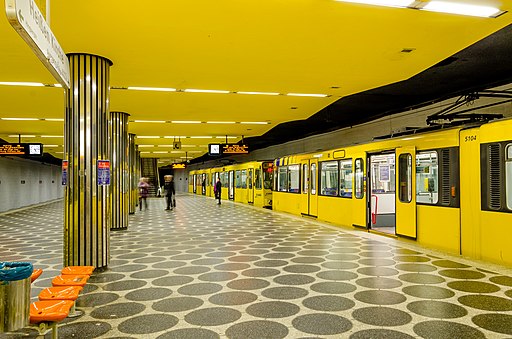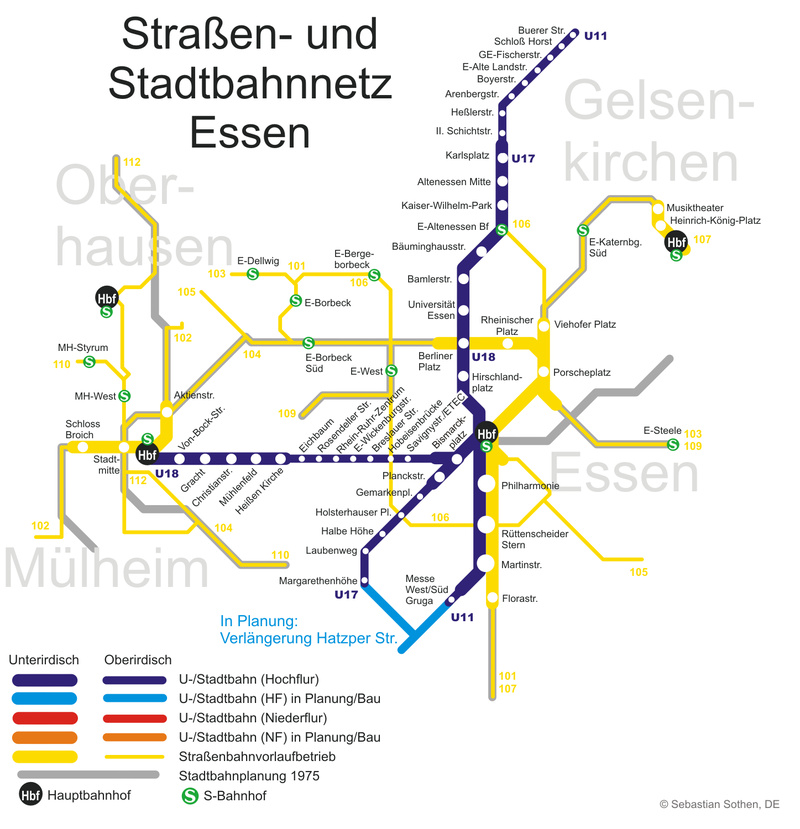The Essen Stadtbahn Metro railway is 21.5 kilometers (13.6 miles). There are 22 underground stations (and additional surface level stops, where the trams travel).
The ticket price varies according to the distance traveled. The system is divided into four zones, called Zone A, Zone B, Zone C and Zone D. The basic ticket is valid for 20 minutes and the least expensive option, at just €1.60 ($US 1.82).
Train service typically begins at 4:30 a.m. and runs continuously until closing, at 11:30 p.m.
Trains run every 10 minutes during regular hours and every 5 minutes during peak hours.
Essen does not have its own airport.
Stadtbahn Metro (Stadtbahn Essen)
With over 580,000 residents, Essen is positioned as the ninth largest city in Germany – however it reached fifth at its height—and fourth in the Ruhr region, an area where the largest number of people in the country are concentrated.
Many people see Essen as the country’s energy capital. It is home to the two major electric companies, E.ON SE and RWE AG.
Perhaps due to the enormous industrial breakthrough experienced by the city in the mid-twentieth century, it became the destination for thousands of Germans and other Europeans seeking to earn a living in manufacturing.
However, a great number of immigrants left Essen, with the natural evolution of the business sector that followed the 70s. They once worked in the city’s factories but now decided to leave the major city.
However, the demographics of the city continued to increase in the 60s, prior to the depopulation. Local authorities were then obligated to meet the service needs of the new residents.
Transportation was one of the residents’ basic needs and despite Essen’s substantial tram network, the vehicles proved insufficient. Consequently, plans to resolve Essen’s mobility issue became a priority.
Following years of projects that were barely viable, the city’s transportation authorities opted for an underground alternative. Opened on May 28, 1877 and baptized the Stadtbahn Essen, this was a medium sized light rail that would be responsible for transportation throughout the main city.
The current railway is 21.5 kilometers (13.6 miles). There are 22 underground stations (and additional surface level stops, where the trams travel).
Lines and stations
Essen’s light rail system travels along a central subway route that extends from Essen Hauptbahnhof to Berliner Platz. It crosses the city center where the trains, on Stadtbahn’s 3 commercial lines travel as well. The remaining structure is surface level.
The northern section is one example. It is serviced by the U-11 and U-17 lines and runs from Berliner Platz to Karlsplatz. Similarly, the U-17 and U-18 lines service the Essen Hauptbahnhof – Bismarckplatz route.
Line U-11
Line U-11’s route begins in the Gelsenkirchen-Horst community. From there, it circulates through Emscher and Rhein-Herne-Kanal while traveling in the direction of central Essen.
The line’s speedy connection between Altenessen’s northern district and the exposition center and Grugapark park is especially useful. Included below are U-11’s 23 stops:
Gelsenkirchen Buerer Straße (Gelsenkirchen District-Horst), Gelsenkirchen Schloss Horst (Gelsenkirchen District-Horst), Gelsenkirchen Fischerstraße (Gelsenkirchen District-Horst), Alte Landstraße, Boyer Straße, Arenbergstraße, Heßlerstraße, II. Schichtstraße, Karlsplatz (Altenessen District-Nord), Altenessen Mitte (Altenessen District-Süd), Kaiser-Wilhelm-Park, Altenessen Bahnhof (Altenessen District-Süd), Bäuminghausstraße, Bamlerstraße, Universität Essen (Stadtkern District), Berliner Platz (Stadtkern District), Hirschlandplatz (Stadtkern District), Essen Hauptbahnhof (Stadtkern District), Philharmonie (Südviertel District), Rüttenscheider Stern (Rüttenscheid District), Martinstraße (Rüttenscheid District), Messe Ost/Gruga (Rüttenscheid District), Messe West/Süd/Gruga (Rüttenscheid District)
Line U-17
There are 17 stations on Line U-17. The route begins at the Karlsplatz stop in the Altenessen district and travels to Essen’s southern zone. The stations from Karlsplatz to Rampe Planckstraße are underground, while the rest are surface level. Line U-17’s stations are included below:
Karlsplatz (Altenessen District-Nord), Altenessen Mitte (Altenessen District-Süd), Kaiser-Wilhelm-Park, Altenessen Bahnhof (Altenessen District-Süd), Bäuminghausstraße, Bamlerstraße, Universität Essen (Stadtkern District), Berliner Platz (Stadtkern District), Hirschlandplatz (Stadtkern District), Essen Hauptbahnhof (Stadtkern District), Bismarckplatz, Planckstraße, Gemarkenplatz, Holsterhauser Platz (Holsterhausen District), Halbe Höhe, Laubenweg, Margarethenhöhe (Margarethenhöhe District)
Line U-18
There are 17 stations on Line U-18. They are distributed from eastern Essen, to the west, to the city of Mülheim an der Ruhr. The route covers the surrounding areas of Allee-Center Altenessen, Limbecker Platz, central Essen, RheinRuhrZentrum and Forum Mülheim and it is the only one that does not share its railways with the city tram. The U-18 includes the following stops:
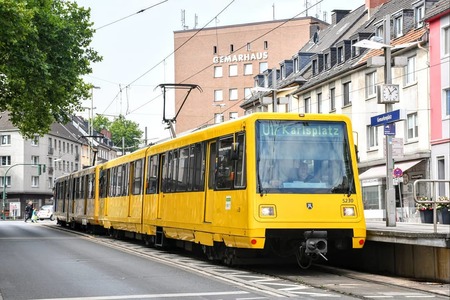 Essen Stadtbahn
Essen Stadtbahn
Berliner Platz (Stadtkern District), Hirschlandplatz (Stadtkern District), Essen Hauptbahnhof (Stadtkern District ), Bismarckplatz, Savignystraße/ETEC, Hobeisenbrücke, Breslauer Straße, Wickenburgstraße, RheinRuhrZentrum (Mülheim an der Ruhr District), Rosendeller Straße, Eichbaum (Heißen District), Heißen Kirche (Heißen District), Mühlenfeld (Heißen District), Christianstraße (Altstadt I District), Gracht (Altstadt I District), Von-Bock-Straße, Mülheim –Ruhr– Hauptbahnhof (Altstadt District)
Connections
The Essen Metro connects to the city’s other transportation systems, including the buses, suburban trains and rapid transit lines.
The city is extremely interconnected, meaning riders are always just a few meters away from a public transportation option. Several Essen Stadtbahn stations are serviced by the tram routes as well.
Stations
- Gelsenkirchen Buerer Straße: Connects to bus routes SB36, 252, 253, 254, 258, 259, 260, 383 and 396 and tram route 301.
- Gelsenkirchen Schloss Horst: Connects to bus routes SB36, 253, 254, 259, 260, 383 and 396 and the tram route 301.
- Gelsenkirchen Fischerstraße: Connects to bus routes 396.
- Boyer Straße: Connects to bus routes 189 and 263.
- Arenbergstraße: Connects to bus routes 189 and 263.
- Karlsplatz: Connects to bus routes 162, 172, 173 and 183.
- Altenessen Mitte: Connects to bus routes 162, 170 and 172.
- Kaiser-Wilhelm-Park: Connects to bus routes 162 and 172.
- Altenessen Bahnhof: Connects to the S-Bahn’s S2 line and the Rhein-Emscher-Express (RE3) express route. This station also connects to bus routes 140, 162, 172 and 183 and tram route 108 as well.
- Bamlerstraße: Connects to bus route 196.
- Universität Essen: Connects to bus routes SB16 and 166.
- Berliner Platz: Connects to bus routes 145, 166 and SB16 and tram routes 101/106, 103, 105 and 109
- Essen Hauptbahnhof: Connects to the S-Bahn lines, S1, S2, S3, S6 and S9 and express routes, RE1, RE2, RE6, RE11, RE14, RE16, RB40 and RB42. This station also connects to tram routes, 101/106, 105, 107 and 108 and bus lines, 145, 146, 147, 154, 155, 166, 193, 196, SB14, SB15, SB16 and SB19.
- Philharmonie: Connects to tram routes 107 and 108.
- Rüttenscheider Stern: Connects to tram routes, 101/106, 107 and 108.
- Martinstraße: Connects to tram lines 107 and 108 as well as bus lines, 142M, 160 and 161.
- Messe Ost/Gruga: Connects to bus route 142.
- Messe West/Süd/Gruga: Connects to bus route 142.
- Bismarckplatz: Connects to bus route 196.
- Hobeisenbrücke: Connects to tram line 101/106.
- Breslauer Straße: Connects to bus routes 160 and 161.
- Wickenburgstraße: Connects to bus routes 145 and 196.
- RheinRuhrZentrum: Connects to bus routes, 129, 130 and 138.
- Eichbaum: Connects to bus route 136.
- Heißen Kirche: Connects to bus routes 129, 132, 136, 138 and 753.
- Von-Bock-Straße: Connects to bus route 131.
- Mülheim –Ruhr– Hauptbahnhof: Connects to the S-Bahn’s S1 and S2 lines and the express routes, RE1, RE2, RE6 and RE11. This station also connects to bus lines 122, 124, 128, 131, 132, 133, 135, 151 and 752.
- Holsterhauser Platz: Connects to tram route 101/106.
- Margarethenhöhe: Connects to bus route 169.
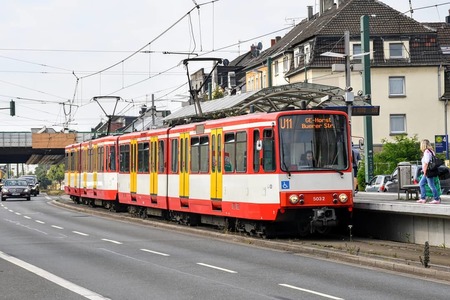 Essen Metro
Essen Metro
Fares
The Essen Metro has various payment options, including tickets and reloadable cards. The price is based on the distance the rider travels. The distance is divided into four large areas, known as Zone A, Zone B, Zone C and Zone D. However, a “Short Distance” option is also available. It includes a maximum of 4 stations and lasts 20 minutes.
Payment prices and options are detailed below:
Einzel Ticket
This is the metro’s simplest ticket option. It includes travel within a specific time frame, that begins once the ticket is validated.
- K (Short Distance): €1.60 ($US 1.83). Valid for 20 minutes.
- Zone A: €2.80 ($US 3.21). Valid for 90 minutes.
- Zone B: €5.90 ($US 6.76). Valid for 120 minutes.
- Zone C: €12.50 ($US 14.32). Valid for 180 minutes.
- Zone D: €15.30 ($US 17.53). Valid for 300 minutes.
4er Ticket
This ticket includes 4 trips within a set period. The 4er ticket’s compatibility with buses and trams make it ideal for riders that plan to transfer to another mode of transportation.
- K (Short Distance): €5.90 ($US 6.76). Valid for 20 minutes.
- Zone A: €10.20 ($US 11.69). Valid for 90 minutes.
- Zone B: €21.40 ($US 24.52). Valid for 120 minutes.
- Zone C: €44.40 ($US 50.87). Valid for 180 minutes.
- Zone D: €54.00 ($US 61.87). Valid for 300 minutes.
24-StundenTicket
These tickets are for students in the city. They provide unlimited 24-hour access to the city’s metro, buses and trams.
- Zone A: €7.00 ($US 8.02).
- Zone B: €14.20 ($US 16.27).
- Zone C: €24.30 ($US 27.84).
- Zone D: €29.10 ($US 33.34).
48-StundenTicket
These tickets are for students in the city. They provide unlimited 48-hour access to the city’s metro, buses and trams.
- Zone A: €13.30 ($US 15.24).
- Zone B: €27.00 ($US 30.94).
- Zone C: €46.20 ($US 52.93).
- Zone D: €55.30 ($US 63.36).
YoungTicket
This monthly ticket is designed for students in the city and may be used to transfer to the metro, bus or tram for 30 consecutive days. The cost includes Zone D pricing only. The ticket is completely personalized, and identification must be carried along with it.
Cost: €69.95 ($US 80.14)
Ticket1000
The Ticket1000 is a monthly subscription. Its price is based on the number of zones traveled and it may be used on the metro, bus and tram.
- Zone A: €76.00 ($US 87.08).
- Zone B: €109.35 ($US 125.29.
- Zone C: €147.30 ($US 168.77).
- Zone D: €185.30 ($US 212.31).
BärenTicket
This ticket is designed for adults, age 60 and older, including seniors who continue to work. This is a monthly subscription and the fare corresponds to Zone D.
Cost: €86.70 ($US 99.34).
Schedule
The Essen Metro offers a very convenient schedule for riders. Service begins at 4:30 a.m. on weekdays and runs continuously until closing at 11:30 p.m. (although some stations close at 11:00 p.m.).
Service is available from 7:00 a.m. to 11:00 p.m. or 11:30 p.m. on Saturdays. The wait time between trains increases as well.
Service begins at 8:00 a.m. on Sundays and holidays. Like Saturdays, trains run less frequently, due to decreased customer demand.
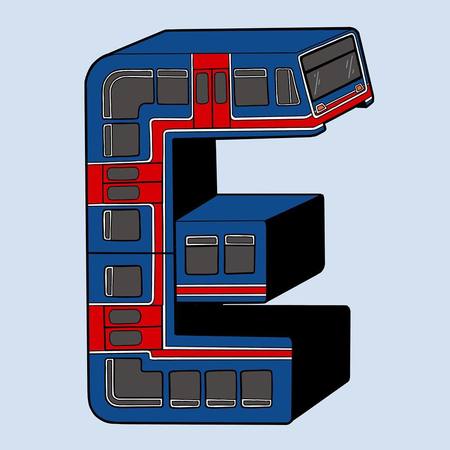
The typical wait time between trains is every 10 minutes – during peak hours the frequency is reduced to every 5 minutes. The frequency is every 15 minutes on Saturdays, Sunday and holidays.
Accesibility
The main objective of Essen Metro construction was the inclusion of every one of the city’s social groups. Accordingly, it was designed to accommodate elderly people and individuals with reduced mobility.
Each train is low level to better facilitate the entry and exit of passengers. Space is also reserved for wheelchairs, strollers and bicycles.
Dedicated metro personnel are also available to assist riders, when requested. This can range from assistance moving around the station to advice on which tickets to purchase.
Regulations
- Any intentional harm done to transport vehicles or overall facilities is punishable by fine. If the behavior persists, the responsible party will be expelled from the system.
- Baggage must not impede the movement of other passengers.
- Items with characteristics or behavior that disturbs other passengers is prohibited. This includes odorous or potentially toxic materials, irritating noises and more.
- Emergency devices that are available throughout Essen Metro’s trains and stations may not be used when there is no true emergency. Such behavior is considered sabotage of the system and comes with a fine.
- Wearing skates on the metro is not permitted. Riding on skateboards, scooters or similar items is also prohibited. Authorized personnel may ask first time offenders to cease using these items and when failing to do so, they will be asked to leave.
- Aggressive behavior, insults or intimidation of other riders is absolutely prohibited on the Essen Metro.
- Smoking on trains and in stations is not permitted.
- Eating on the metro is prohibited.
- Alcohol consumption or being under the influence of alcohol is not permitted in any metro facilities.
- The unauthorized distribution of any type of propaganda is absolutely prohibited at metro stations and on trains.
- Individuals must always remain behind the yellow designated line.
- Panhandling is prohibited on metro trains and in stations.
- Carrying fire arms on trains is prohibited, unless the person is a clearly identified official.
- Headphones must be used, when playing music on portable devices.
- Individuals are not permitted on the train tracks. If their belongings happen to fall on the tracks, they must request assistance from service personnel.
Connections to the airport
Unfortunately, Essen does not have its own commercial airport. Instead, there is just one air facility for private use, independent pilots and charter flights. However, most visitors use the Düsseldorf International Airport, which is incidentally, the third busiest air terminal in Germany.
This airport is an ideal option. It’s just 30 minutes from Essen’s city center. To reach it by metro, one can ride to Essen Hauptbahnhof station, accessible from three commercial lines. From there, one boards the RE 10162 express which travels directly to the airport. It typically takes no longer than 35 – 40 minutes and stops right outside the airport.
Similarly, since the cities are very well connected, access to other cities from the Düsseldorf International Airport is also possible. This is available through express routes and suburban railways.
Future expansions
One of Essen Metro’s most notable projects is the expansion of the U-17 line, which will be extended, via three stations, from the Margarethenhöhe terminal to the south. Although the plan is not definite, there have been talks of potentially expanding the U-11 line south as well.
There are additional plans to replace the old high-floor tram cars, especially on routes 101 and 107. These would be substituted with ones that have fold-away stairs since they share tracks with the U-11 metro line, in the Essen Hauptbahnhof – Martinstraße section.
The current outline includes a partial reduction of the platform heights on the system’s underground stops with the goal of facilitating the movement of tram lines 101 and 107. The new platforms would be slightly elevated but would not inconvenience metro and tram riders. The old tram line vehicles would become completely incompatible.
Media
Tourist sites
One of Essen’s icons is the Zollverein Coal Mine Industrial Complex, a former industrial site, that was declared a UNESCO world heritage site in 2001. It belongs to the European Route of Industrial Heritage and maintains a rich history that spanned from the mid-nineteenth century to the 90s, when it was finally closed. Guided tours along with stories of its onsite factories are available today. The complex has a magnificent restaurant as well, which has successfully fused Essen’s manufacturing past with the latest culinary trends.
To reach the complex, one must take the metro to Altenessen Bf station, serviced by lines U-11 and U-18 and walk a few meters to the S-Bahn Essen-Altenessen stop. From there, one must take the S2 route and get off at Essen-Zollverein Nord station.
Additionally, about 500 meters from Berliner Platz station, accessible on three metro lines, is the famous GOP Varieté Essen theatre and restaurant. The theatrical productions feature acrobats, magicians, ventriloquists, singers and other artists that entertain and interact with the public. The productions change monthly so that new performances are always available. The place is characterized by a playful atmosphere, that is inspired by both its British attributes and its classic circus appeal.
Metro map of Essen
Maps by Sebastian Sothen, DE See map full resolution. It may take a little bit to load.Download map.
Essen Stadtbahn map
- Also Known As: Stadtbahn
- Passengers/Day
- Fares: honour system
- 24h operation: No
- Air Conditioning: No
- Walk between platforms: Yes
- Driverless trains: No
- Screen Doors Platforms: No
- 1.50 euros
- Essen Metro Official Website
- Tlf: +49 209 1584 0
Help us
If you consider that the information we provide is wrong, not accurated, outdated, translation contains errors, and you would like to help us to improve the file...you can contact us here.
Feel free to contact us if you dont find the system you're looking for and we'll add it as soon as we can!
Thank you very much!







